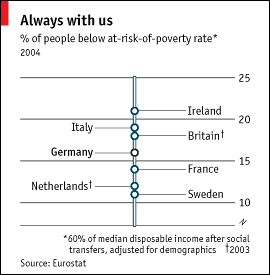European Poverty
 Interesting look at poverty in Europe.
Interesting look at poverty in Europe.
As in many rich countries, poverty is growing. In 2004 some 16% of Germans were poor, defined as having disposable income less then 60% of the national median after social transfers—a sharp rise from 2000. This is around the European average (see chart), but German poverty was once well below that average. Admittedly the figure is inflated by the effect of unification. Poverty in the east is at a British-style 20%—a level also reached among the young and immigrants.Poverty is rising in Europe just like in the US. This makes me think that rising poverty in the US is more likely being caused by globlization (although it is also causing poverty and income inequality world wide to decrease) and a transition from an industrial to a knowledge economy than social or tax policy in the US.
I have written before about how the American definition of poverty is a bit suspect as it doesn't take the Earned Income Tax Credit into account. I don't know what to think of the European one: 60% of the national median after social transfers. I go back and forth on whether the definition of poverty should be relative to the wages of others or if it should be an absolute based on the ability to pay for food, shelter, clothing and medicine. Maybe they end up with similar results.
I wonder where America would show up on the chart with this definition. My guess is somewhere next to Britain, but I really don't know.
via The Economist





1 comment:
If the study doesn't account for immigration it isn't really looking at poverty honestly. Dishonesty isn't really immoral. It's policy wherever politics enters. What you're looking at is extremely political.
Post a Comment
Note: Only a member of this blog may post a comment.